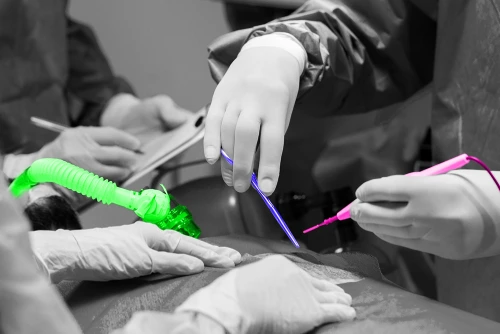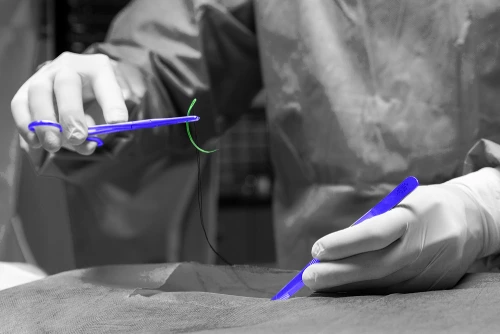7 Essential Benefits of Medical Data Annotation Services for Healthcare Advancement
Artificial intelligence (AI) is revolutionizing healthcare, and at the core of this transformation are medical data annotation services.
By accurately labeling medical images, text, and videos, these services train AI models to diagnose diseases, personalize treatments, and provide vital healthcare insights.
But why is medical data annotation so crucial for healthcare advancements? Let’s explore its key benefits and impact on the future of AI-powered patient care.
What Are Medical Data Annotation Services?

Medical data annotation services play a crucial role in developing AI-powered solutions for the healthcare industry. These services involve the detailed labeling of medical data, including images, videos, and text, to create datasets that are easily understandable by machine learning (ML) models. Accurate annotation helps in training these models to recognize patterns, detect diseases, and provide insights that improve diagnosis and treatment outcomes.
Data annotation in the medical field encompasses a variety of data types:
- Medical Imaging: Annotating X-rays, MRIs, CT scans, and ultrasound images for disease detection.
- Textual Data: Labeling electronic health records (EHRs), clinical notes, and patient histories to improve natural language processing (NLP) in healthcare.
- Video Annotation: Highlighting movements, physiological changes, or surgical procedures to assist in robotic surgery or real-time diagnostics.
Ultimately, medical data annotation services bridge the gap between raw data and the AI systems that interpret it, making healthcare more precise and efficient.
The Importance of Medical Data Annotation Services in Healthcare

Enhancing AI-Based Diagnosis and Treatment
AI-based tools have the power to transform healthcare by diagnosing conditions with greater speed and accuracy. However, the efficiency of these tools is highly dependent on the quality of annotated datasets used to train them. Well-labeled data allows AI to “learn” to recognize abnormalities, compare them against known disease markers, and provide reliable assessments.
For example, annotated radiology images can help ML algorithms detect early signs of diseases like cancer, fractures, or neurological conditions. Over time, AI models can significantly improve in precision, assisting healthcare professionals in making informed decisions.
Improving Predictive Healthcare Analytics
Predictive healthcare analytics involve using ML and AI algorithms to identify potential health risks before they become critical. To make accurate predictions, these models require data annotated with vital patient details, symptoms, genetic predispositions, and other health markers.
Medical data annotation services assist in preparing comprehensive datasets, allowing AI to detect trends and predict diseases or health events. This empowers healthcare professionals to take preventative action and implement personalized treatment plans that can improve patient outcomes.
Key Benefits of Medical Data Annotation Services

1. Streamlining Clinical Decision-Making
By leveraging annotated medical data, healthcare AI systems can support clinicians in making swift and accurate decisions. Whether it’s assisting in complex surgeries or analyzing pathology slides for cancer detection, AI helps reduce the time doctors need to review cases, thus improving the overall efficiency of clinical workflows.
2. Enhancing Personalized Medicine
Personalized medicine is one of the most promising developments in healthcare, focusing on tailored treatment plans based on individual patient characteristics. Medical data annotation enables AI to analyze genetic information, patient history, and lifestyle data, providing insights into which treatments are likely to be most effective for specific individuals.
This level of detailed data labeling helps AI make informed recommendations, minimizing the trial-and-error approach that can often occur in conventional treatments.
3. Accelerating Pharmaceutical Research
The pharmaceutical industry greatly benefits from medical data annotation. When developing new drugs, researchers must analyze a massive amount of clinical data to assess potential outcomes, side effects, and patient reactions. Accurate data labeling helps AI systems process this information quickly, accelerating drug discovery and development.
AI-based models trained on annotated datasets can even predict drug behavior or effectiveness, enabling pharmaceutical companies to bring life-saving drugs to market faster.
How Medical Data Annotation Services Improve Patient Care

Increasing Accuracy in Diagnostics
A key factor in quality patient care is the accurate and early detection of diseases. Machine learning algorithms trained with properly annotated medical data can support diagnostic tools that outperform traditional methods. For example, AI models can analyze radiographic images for early signs of disease or use NLP to extract meaningful insights from clinical notes.
Annotated datasets help minimize the chances of misdiagnosis, ensuring patients receive the correct treatment promptly.
Supporting Remote Patient Monitoring
Medical data annotation also plays a role in telehealth and remote patient monitoring. Wearable devices, smartwatches, and remote sensors collect vast amounts of data that require analysis to provide meaningful health insights. Data annotation services prepare this information so AI models can accurately assess patient vitals, monitor health trends, and alert healthcare professionals to any anomalies.
This enables continuous, real-time monitoring of patients’ conditions and is especially valuable for individuals with chronic illnesses or those requiring long-term care.
Medical Data Annotation and Its Role in AI-Powered Healthcare Technologies
Driving Advancements in Radiology and Imaging
One of the fastest-growing applications of medical data annotation services is in radiology and imaging. AI-powered diagnostic tools can analyze X-rays, MRIs, CT scans, and ultrasounds to detect diseases that might otherwise go unnoticed. Accurate annotation helps AI models learn to differentiate between healthy and abnormal tissue, improving the detection and classification of diseases.
For instance, a well-annotated set of mammograms can help AI identify early-stage breast cancer more accurately than some conventional screening methods.
Enabling Robotics and Minimally Invasive Surgeries
Medical data annotation services contribute to the development of robotic surgical tools and minimally invasive procedures. Video annotation helps AI models understand and replicate complex movements during surgeries, enhancing their precision and reducing the potential for human error. Such technologies offer better surgical outcomes, reduced recovery time, and improved patient safety.
Choosing the Right Medical Data Annotation Services for Your Needs
When selecting a provider for medical data annotation services, several factors are crucial to consider:
- Accuracy & Quality Control: Ensure that the provider has rigorous quality control measures to guarantee accurate annotation. The integrity of your AI models depends on high-quality labeled data.
- Data Security & Compliance: Medical data is highly sensitive, requiring secure handling and compliance with privacy regulations such as HIPAA or GDPR.
- Industry Experience: Look for a provider with a proven track record in medical data annotation, as expertise in healthcare-specific annotation processes can greatly improve your dataset’s effectiveness.
At Subul Data Annotation, we specialize in delivering high-quality medical data annotation services tailored to your AI and ML model needs. Our team is experienced in labeling complex medical data securely, accurately, and efficiently. If you’re looking to enhance your healthcare AI solutions, contact us today for a consultation.